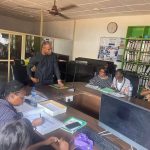Nigeria accounts for approximately 22 percent of global paediatric HIV cases, largely due to inadequate access to testing and treatment during pregnancy, according to Dr. Godwin Emmanuel, Managing Partner and Impact Officer at MOZUK Future Solutions. The alarming statistic highlights the critical need to address gaps in HIV treatment in the country.
Dr. Emmanuel, speaking in a statement, emphasized the urgency of innovative solutions to curb the transmission of HIV from mother to child (MTCT). He cited the Joint United Nations Programme on HIV/AIDS (UNAIDS) estimate that Nigeria is a major contributor to the global burden of paediatric HIV, underscoring the need for new approaches in combating MTCT.
“One of the promising solutions is HIV self-testing (HIVST),” Dr. Emmanuel stated, referring to a recent study in Lagos and Kano. The research demonstrated how integrating HIV self-testing kits into services provided by Traditional Birth Attendants (TBAs) can help address the challenges of MTCT in underserved communities. The intervention, conducted in 182 TBA clinics across three Local Government Areas, trained TBAs to distribute the self-testing kits and offer counselling, resulting in significantly increased testing uptake among pregnant women.
Before the introduction of HIVST, HIV testing rates were low, with only 60 percent of pregnant women in Lagos and 38 percent in Kano having ever tested for HIV. However, after the intervention, every woman in the study voluntarily used the self-testing kits during antenatal visits. The study recorded an overall positivity rate of 0.8 percent, with 80 percent of those who tested positive doing so for the first time.
The intervention also demonstrated that all HIV-positive women were successfully linked to antiretroviral therapy (ART), which significantly reduces the risk of mother-to-child transmission.
Dr. Emmanuel highlighted that the success of the Lagos and Kano initiative illustrates how HIVST can be a cornerstone in the fight against paediatric HIV infections. He also stressed the importance of reducing stigma and increasing confidentiality, especially in rural areas where HIV-related stigma remains high.
“The ability to test in private settings, like at home, reduces the stigma surrounding HIV and empowers women to make informed decisions about their health and pregnancies,” Dr. Emmanuel explained. He added that early diagnosis and access to ART can reduce MTCT risks to below one percent.
Despite the promising results, Dr. Emmanuel acknowledged challenges in implementing HIVST, particularly in rural areas where some women may need additional support to use the kits correctly. He also emphasized the importance of a robust referral system to ensure those who test positive are connected to treatment services.
The role of TBAs, who are trusted by many communities, is crucial in addressing these barriers. By incorporating HIVST into TBA services, the initiative helps bridge the gap in healthcare access, particularly for pregnant women who might otherwise avoid formal healthcare settings due to stigma or logistical challenges.
Dr. Emmanuel called for a coordinated national strategy to eliminate mother-to-child transmission of HIV, which should include policy integration, community engagement, and capacity-building efforts. He stressed that Nigeria must prioritize a comprehensive approach to end the HIV epidemic in children and ensure that every mother has the opportunity to live a healthy life.




